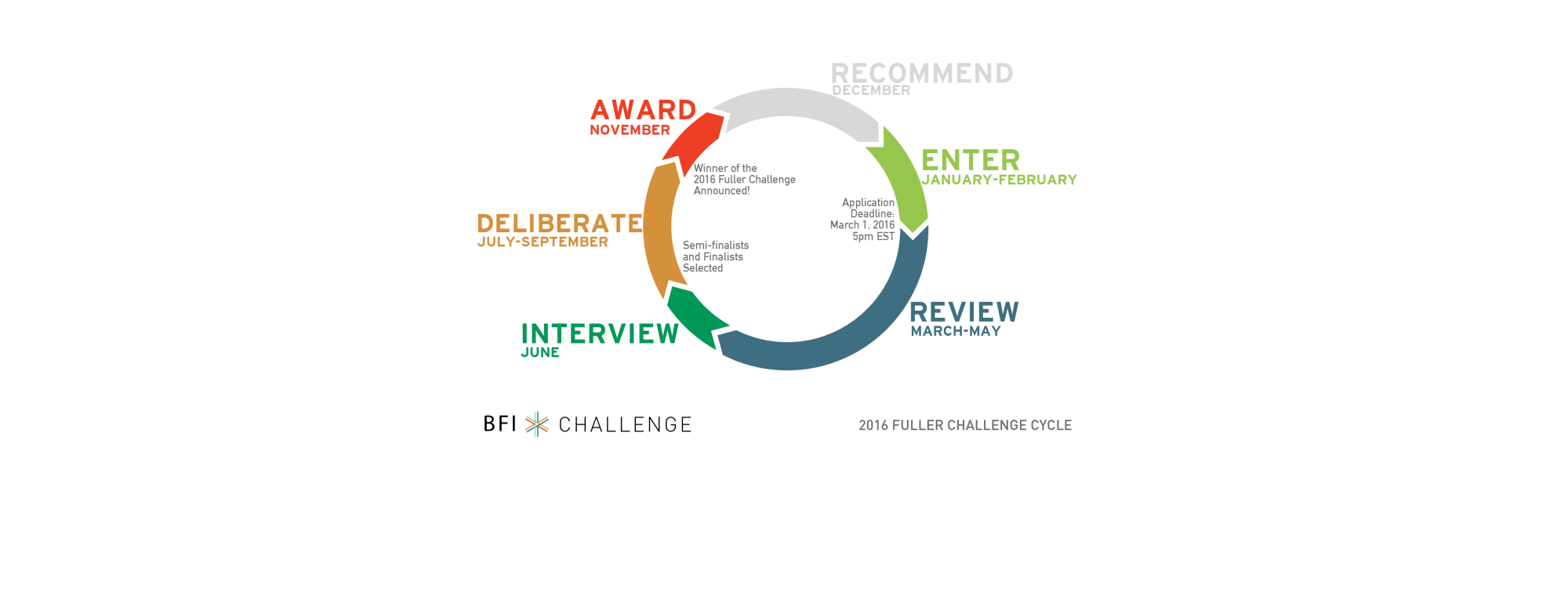
DEADLINE FOR ENTRY: March 1st 2016 17:00 EST
The Challenge
Each year, The Buckminster Fuller Institute (BFI) invites people from all over the world—including scientists, designers, architects, activists, artists, planners, entrepreneurs, and students—to submit their innovative solutions to humanity’s most pressing problems.
A $100,000 grand prize is awarded to support the development and implementation of one outstanding strategy, but the Fuller Challenge offers more than a single financial award. In addition to the $100,000 grand prize, BFI seeks to leverage further resources for Finalists, Semi-finalists, and select entrants through its network and Catalyst Program. For more information, visit the Catalyst Program website.
In 2016, BFI will recognize outstanding student proposals to the Challenge. This is the first time that student entries will undergo a separate review and selection process. For more information, visit the Student Award website.
For all enquiries, please get in touch with BFI: [email protected]
For more information about the Challenge see bfi.org/challenge
The Inspiration
Buckminster Fuller led a life of prolific research, invention, writing and teaching. He developed a comprehensive systems approach to understanding complex global problems and a unique set of design science principles that embodied a deeply attuned ecological aesthetic. Fuller conceived and prototyped new strategies intended to enable all of humanity to live lives characterized by freedom, comfort, and dignity, without negatively impacting the earth’s ecosystems or the biosphere’s regenerative capacity. He emphasized that the technology and know-how already exist to successfully surmount our global challenges and he advocated “doing more with less” by increasing the overall performance of every resource invested in a system.
What they are looking for
Winning the Fuller Challenge requires more than a stand-alone idea or innovation. BFI looks for whole-system solutions that both demonstrate a clear grasp of the ‘big-picture’ and focus on a well-defined need of critical importance. If, for example, your proposal emphasizes a new design, material, process, service, tool or technology, it is essential that it be part of an integrated strategy that simultaneously addresses key social, environmental, and economic factors.
We seek strategies that put forth what Fuller called a preferred state model – one designed to optimize conditions from inception in order to create the most desirable, sustainable, regenerative future outcome. We are also seeking solutions that embody what Fuller referred to as the trimtab principle - demonstrating that a relatively small initiative inserted into a system at the right time and place can achieve maximum leverage for advantageous change.
Initiatives representing a range of development stages will be reviewed – from early stage proposals with completed proof of concept to fully operating models ready to expand. Entries can tackle urgent needs at a range of geographic scales: from strategies designed for global scale implementation to initiatives tailored to local or regional conditions. Non-profit, for-profit, and hybrid initiatives are all eligible.
Winning Strategies must successfully integrate the Fuller Challenge criteria:
Visionary put forth an original idea or synthesize existing ideas into a new strategy that creatively addresses a critical need.
Comprehensive apply a whole-system approach to all facets of the design and implementation process and aim to simultaneously address multiple goals, requirements and conditions.
Anticipatory factor in critical future trends and needs as well as the projected impacts of a project’s implementation in the short and long term.
Ecologically Responsible reflect nature’s underlying principles while enhancing the Earth’s life support systems.
Feasible can demonstrate proof of concept, and relies on existing technology and/or provable science; have a solid team and/or demonstrate a convincing capacity to implement the project.
Verifiable able to withstand rigorous empirical testing and provide evidence for potential or actual positive impacts; claims made must be authentic.
Replicable able to scale and be widely adapted to similar conditions elsewhere.